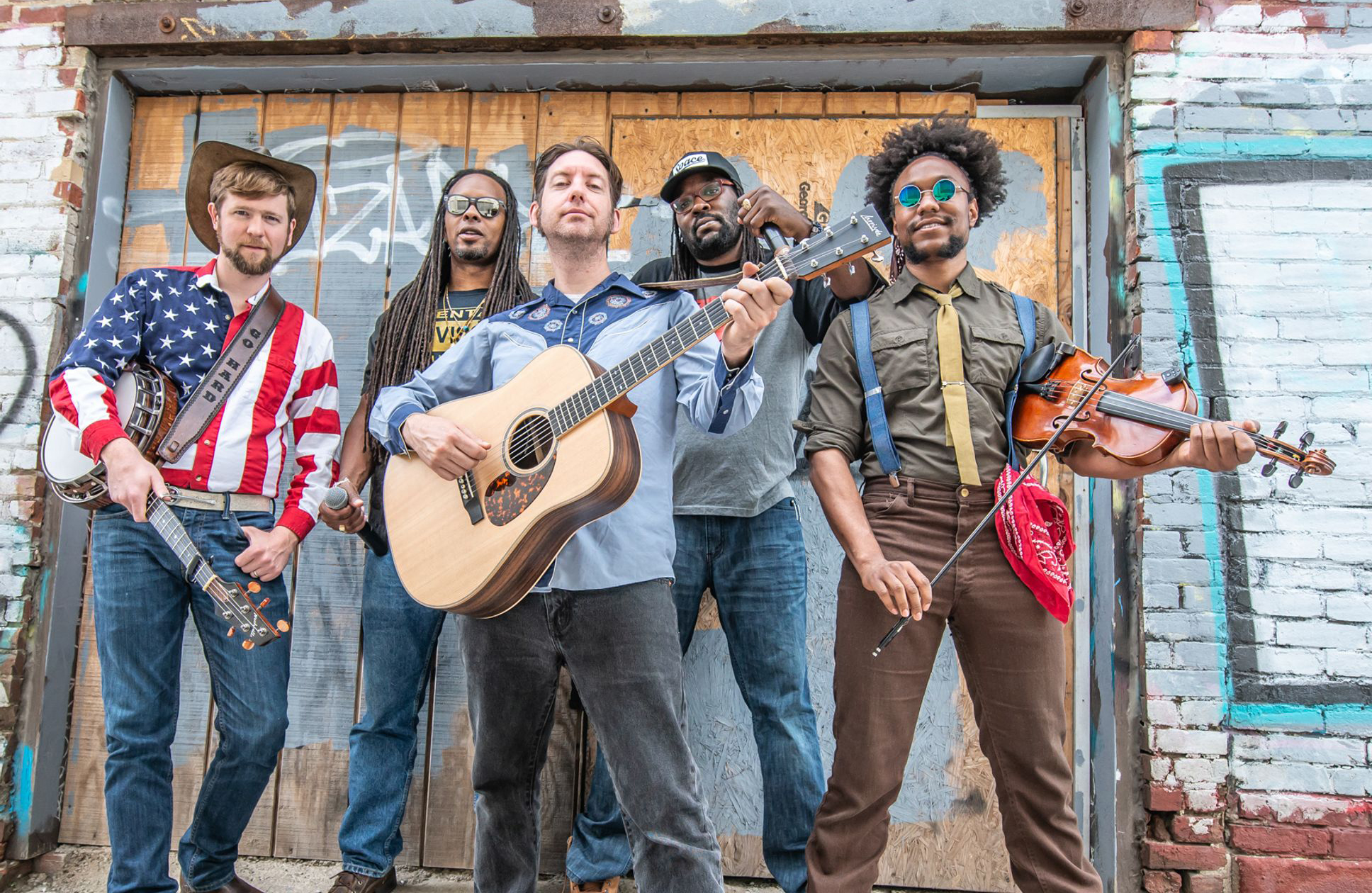Spotlight: Gangstagrass

This past September, No Time for Enemies, Gangstagrass’ fifth record, topped the Billboard Bluegrass chart. As expected, the band was emotional when they heard the news. “I was stunned,” reflects R-Son, one of Gangstagrass’ MCs. “I’m not going to lie, I shed a couple of tears that day. But I knew it was possible, just because of how good the work the guys did was.”
Yet, for Gangstagrass mastermind Rench, topping the chart also served as a moment of vindication for the band, in terms of how they’re seen by the bluegrass “old guard.” “We’re not too concerned about legitimacy with bluegrass folks if they’re too traditionalist, but it’s still nice to be able to say, ‘Yeah, but we were the No. 1 bluegrass album,’” he admits. “Especially since it’s the first No. 1 bluegrass album from a group with rappers. Making a little bit of history there—breaking some boundaries—is really meaningful for us.”
When Rench started the project on his own, his combination of bluegrass and hip-hop didn’t exactly resonate with the masses. “I was making beats and producing for local hip-hop groups and I’d always have these ideas, like, ‘Oh, man, it’d be cool if there was a pedal-steel guitar in there or a fiddle,’” he recalls. “Nobody wanted to go for that so it was something I had to start taking on myself.” The studio recordings started to gain some traction online, which prompted Rench to realize that Gangstagrass had legs as a touring outfit. “It had gotten so much attention from being blogged about and downloaded—I thought, ‘Wow, I should turn this into a live act.’”
Right around the time that Rench had his realization, he received a call from FX, asking of they could use one of his songs during a commercial spot for the Western crime drama Justified. Eventually, Gangstagrass’ “Long Hard Times to Come” was chosen as the show’s permanent theme song.
With that additional mainstream attention, Rench set out to put together a consistent Gangstagrass lineup. “It took some changes to find people who worked on a number of levels,” laments Rench. However, the band’s roster is now solidified: Rench handles vocals, guitar and production duties, Dan Whitener plays banjo and sings, Brian Farrow supplies fiddle and vocals and R-Son the Voice of Reason and Dolio the Sleuth serve as the project’s MCs. “We’ve got it down,” Rench says. “We’ve built up an understanding of working together and how this whole thing combines bluegrass and hip-hop.”
As they first started looking toward their latest LP, the members of Gangstagrass decided to showcase their collective energy. “Leading up to the album, we were saying, ‘We’re going to try to do something that really captures us playing live together. We’re going to do it all in the same room and get that energy of us vibing off each other,’” Rench says. “But the universe had other plans.” They only got through three songs in the studio before COVID-19 forced them into isolation.
However, the group quickly pivoted and decided to finish the album in quarantine. Each member set up their own home recording area and went to work. “Fortunately, everybody was just so professional and able to make everything work. It turned out just as good, if not better, because we knew we had to step up just a little bit,” R-Son adds.
Rench also notes that they used some more experimental recording methods to create No Time for Enemies, which “might not have happened otherwise.” For example, the final cut of the song “Do Better” was tracked during the band’s rotating Twitch livestreams.
“When we started livestreaming, with each of us in isolation, we would all take turns doing something called ‘Kick the Can.’ One of us would lay down a new track idea on Twitch. And then, the next night, the next person would livestream themselves overdubbing their part,” Rench explains. “It would go around the band and then we’d have a track together by the end of the week. And that one, in particular, fit the album so well that we decided to include it.”
The broader thematic elements of the album, which touch on issues of race and social justice, are fitting for Gangstagrass—the members are all interested in thinking critically about the society in which they exist and working toward its betterment. R-Son notes that working together has actually increased the members’ capacity to take advantage of their platform. “We have always been a very forward-thinking bunch of individuals—these are very smart dudes,” he says. “So coming together in the way that we have, we’ve sort of spurred each other on and helped each other go further.”
“We are a bunch of people who are engaged in what’s around us. We are all constantly thinking about the world—wanting it to change and improve,” Rench adds. “We want to be part of the process. Who we are as a band—in terms of being a multiracial, multi-genre act, traveling the country and attracting fans from all kinds of perspectives— gives us a unique opportunity to tour around to different cities and play for very different audiences. We hope to bring a message that bridges the divide.”



















